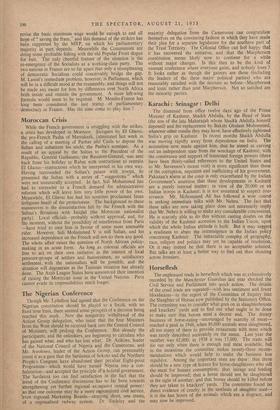The Nigerian Conference ' Though Mr. Lyttelton had agreed that the
Conference on the Nigerian constitution should be played to a finish, with no fixed time limit, there seemed some prospect of a decision being reached this week. Now the temporary withdrawal of the Action Group delegation, who insist that the four 'Ministers from the West should be received back into the Central Council of Ministers, will prolong the Conference. But already the participants, and the onlookers, are beginning to calculate who has gained what, and who has lost what. Dr. Azikiwe, leader of the National Council of Nigeria and the Cameroons, and Mr. Awolowo, leader of the Action Group, can presumably count it as a gain that the Sardauna of Sokoto and the Northern People's Congress have abandoned their peculiar Eight-point Programme—which Would have turned Nigeria into a con- federation—and accepted the principle of a federal government. The Sardauna too can find satisfaction in the fact that the trend of the Conference discussions has so far been towards Strengthening yet further regional as against central power: 'so that one outcome may be a more regionalised civil service, 'even regional Marketing Boards—stopping short, one trusts, of a regionalised railway system. Dr. Endeley and the majority delegation from the Cameroons can congratulate themselves on the convincing fashion in which they have made their plea for a separate legislature for the southern part of the Trust Territory. The Colonial Office can feel happy that it has recovered the initiative, and that the Macpherson constitution seems likely now to continue for a while without major changes. Is this then to be the kind of unusual conference where everyone gains, and nobody loses ?, It looks rather as though the gainers are those (including the leaders of the three major political parties) who are reasonably satisfied with the mixture as before—Macphersori and tonic rather than neat Macpherson. Not so satisfied are the minority parties.


























 Previous page
Previous page